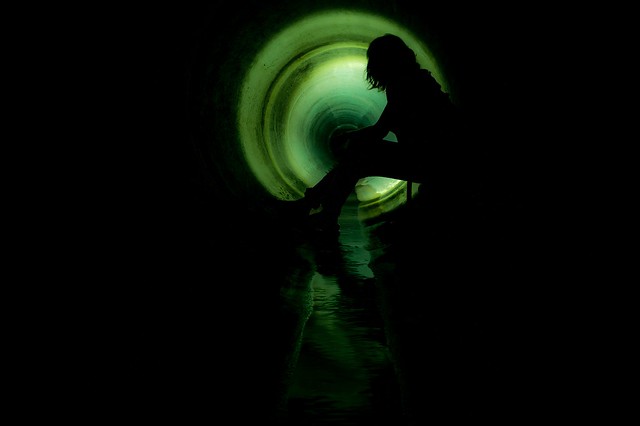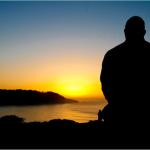
Practicing Urban Contemplation
Some of us apparently believe it is impossible to practice urban contemplation.
We assume we need to head out of town and away from other people to really practice contemplation. Do we need to travel into the country, to the mountains or the desert, into the woods or to the beach to be contemplative? Many of us are convinced we need to get as far as possible from other people to practice contemplation.
Sometimes getting away from other people and our typical routines might help us listen to sacred stillness. We want to leave distractions behind and we feel the best way to do that is to physically leave.
I appreciate how attractive wild places can be. It takes me hours to drive to the monastery where I am an Oblate. While my trip begins in the city, I leave it behind to head up the Pacific coast to Big Sur.
It is easy for us to believe spiritual life lives in wild, remote places.
I believe, though, I am called to practice urban contemplation.
Our contemplative practices are not fragile. We do not need to protect them from other people.
It may seem more pleasant for us to practice contemplation in a bucolic setting, but it is not necessary. We can be just as contemplative in the city as we can in the country.
Urban contemplation is about not paying attention to what distracts us. We may feel more distracted downtown than we do in the country, but it is not necessarily the case.
When we close our eyes and take deep breaths, we can pay attention to sacred stillness in the city.
Most of what distracts me during my contemplative practices comes from within me, not from the city around me.
Urban Contemplation
I was not born contemplative, nor was I born in a large city.
I was taught from an early age it was more valuable to know things than to learn things. Learning was just a step on the path toward knowing while knowing was the goal of learning. It was far better to know the right answer than to be in the process of learning it. Learning means we have not yet arrived at knowing.
Knowing was also more fun than learning. Learning requires patience, practice, and being open to new insights. Learning means we try new things and make mistakes, which just reinforces we do not already know the right answer.
People do not do well in school by learning, they do well by knowing the right answers.
The significant thing about knowing the answer is we have successfully completed learning. We no longer need to be open to new ideas when we already know the answers.
Moving from place to place, for school and for work, I searched for answers.
Gradually I began to realize my answers were not always right. I came to appreciate asking good questions more than having the right answers.
My seeking drew me to larger cities and to monastic life. I was received as a lay Oblate at a Benedictine monastery and hermitage in Big Sur, California.
I follow a rule of life which includes spiritual practices like regular prayer, reading, stillness, and solitude. At least once each year I leave the city where I live to spend time at the monastery.
I recognize a balance of seeking spiritual life in the everyday. The life of the city draws me more deeply into contemplative life, which draws me more deeply into city life.
The challenge for me is becoming a contemplative in the city.
Beginning to Practice Urban Contemplation
The pattern and structure of monastic life gives us a framework to practice urban contemplation.
Everyday life in the city has a rhythm which is different from monastic life at the hermitage. Our daily and weekly schedules are not the same. We incorporate contemplative practices into our lives in our own ways.
It is important for us to take time each day to listen to sacred stillness. Our approach to everyday life is shaped by how we choose to practice urban contemplation.
Practices shape how we perceive our experiences. Urban contemplation is about how we live the situations we experience. As we become more open to spiritual life within us and around us we perceive everyday life in new ways.
Practicing urban contemplation is not limited to sitting and listening to stillness on a bench in the park all day. When I walk in the city each day I see people differently.
Being contemplative in the city is not simply a matter of slowing down, though that helps our paying attention. We practice listening and being open to the life around us.
A Living Practice of Urban Contemplation
There is no magic formula or set of rules for practicing urban contemplation. Some of us follow contemplative practices intended to help us take time to listen and pay attention. Our practices do not ensure we will live as contemplatives in the city.
Our first step might be taking time to set aside what distracts us. It is easy for us to get caught up in the entertainments and attractions which cities offer us. We pay so much attention to work and money, the expectations and other people which distract us. Some of us become so wrapped up in everyday life we are too exhausted to even think about anything else.
We are immersed in so many people and so many things to do we lose track of anything of real depth. It takes us so much effort to skim along the surface of life. Beginning to practice urban contemplation seems like more work than we can do.
The contemplative practices we choose to develop shape how we become contemplatives in the city.
Practicing urban contemplation means we pay attention to spiritual life within us and all around us.
How will we begin practicing urban contemplation in a new way today?
When will we take time to practice urban contemplation this week?
[Image by darkday]
Greg Richardson is a spiritual director in Southern California. He is a recovering assistant district attorney and associate university professor, and is a lay Oblate with New Camaldoli Hermitage near Big Sur, California. Greg’s website is StrategicMonk.com and his email address is [email protected].












